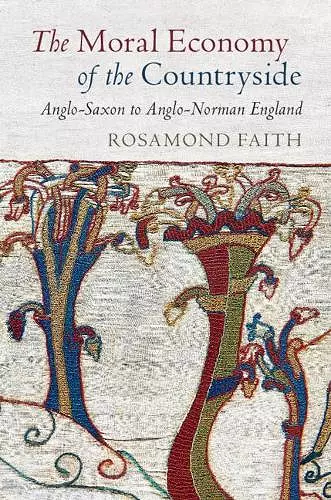The Moral Economy of the Countryside
Anglo-Saxon to Anglo-Norman England
Format:Hardback
Publisher:Cambridge University Press
Published:31st Oct '19
Currently unavailable, and unfortunately no date known when it will be back
This hardback is available in another edition too:
- Paperback£23.99(9781108720069)

Shows the 'moral economy' of early medieval England transformed by 'feudal thinking' in the aftermath of the Norman Conquest.
Shows how the 'moral economy' of medieval England was transformed after the Norman Conquest, when 'feudal thinking' superseded traditional values of rank, reciprocity and worth.How were manorial lords in the twelfth and thirteenth century able to appropriate peasant labour? And what does this reveal about the changing attitudes and values of medieval England? Considering these questions from the perspective of the 'moral economy', the web of shared values within a society, Rosamond Faith offers a penetrating portrait of a changing world. Anglo-Saxon lords were powerful in many ways but their power did not stem directly from their ownership of land. The values of early medieval England - principally those of rank, reciprocity and worth - were shared across society. The Norman Conquest brought in new attitudes both to land and to the relationship between lords and peasants, and the Domesday Book conveyed the novel concept of 'tenure'. The new 'feudal thinking' permeated all relationships concerned with land: peasant farmers were now manorial tenants, owing labour and rent. Many people looked back to better days.
'In the third of a sequence of magisterial and thought provoking books about early English rural society, Rosamond Faith forces us to face the problem of how lordship managed to establish itself in Anglo-Saxon England at all. Her profound and radical understanding of how peasant life works on the ground shines through at every point. Everyone who is interested in English society before 1200, or indeed later, will have to read this book.' Chris Wickham, University of Oxford
'Representing the fruit of over five decades' work on the medieval peasantry, this book takes us closer to the lived world of the Anglo-Saxon peasantry than I would have ever thought possible. It revises traditional wisdom on a host of important subjects, from the origins of feudalism to the impact on the Norman Conquest, and will be the go-to book on early English rural society and life for many years to come.' Levi Roach, University of Exeter
'Like her previous works, this is a dynamic contribution to the study of an often neglected but vital segment of society. Though attempting, as she does, to get into 'the hearts and minds' of the English peasantry is always fated to be an uphill struggle given the nature of the surviving sources … this volume will become a valuable touchstone for future scholars studying medieval social relations.' Stuart Pracy, Agricultural History Review
ISBN: 9781108487320
Dimensions: 235mm x 157mm x 17mm
Weight: 480g
244 pages